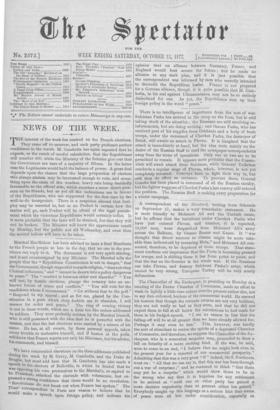The Chancellor of the Exchequer, in presiding on Monday at
a meeting of the Exeter Chamber of Commerce, made an effort to wash-in lightly a little rose-colour over the present rather dim, not to say dun-coloured, horizon of the commercial world. He assured his hearers that though the revenue returns are not very brilliant, they are not really so bad as they seem, and that he did not expect them to fall at all below the calculations he had made for them in his budget-speech. "I see no reason to fear that the falling-off will be at all greater than we have already allowed for. Perhaps it may even be less." This, however, was hardly the sort of stimulant to revive the spirits of a depressed Chamber of Commerce, and therefore, we suppose the Chancellor of the Ex- chequer, who is a somewhat sanguine man, proceeded to draw a bill on futurity of a more exciting kind. If the war, he said, were to come to an end, "I believe that we might look even in the present year for a renewal of our commercial prosperity." Admitting that this was a very great " if " indeed, Sir S. Northcote went on "All that we can say is, that this war has been through out a war of surprises ;" and he ventured to think "that there may yet be a surprise" which would show those to be in the wrong who say that it is hopeless for any settlement to be arrived at "until one or other party has gained a more decisive superiority than at present either has gained." Everybody caught up this language as a serious hint that terms of peace were all but under consideration, especially as
Sir Stafford Northcoto complimented both Russia and Turkey on "having acquitted themselves, in a military sense, in a manner that must place them on a very high pinnacle of reputation,"— language very like that which an official peace-maker would take pains to use. But it seems pretty clear by this time, and almost semi-efficially declared, that Sir Stafford Northcote was only using the language of amiable hope and conciliatory propitiation, not that suggested by official knowledge. An English Chancellor of the Exchequer is very apt to think that all things work to- gether to produce him a surplus ; but there are political purposes worked deeper into the providence of history than English sur- pluses, and probably a permanent solution of the Eastern Question, —a solution impossible as yet,—is amongst these.



































